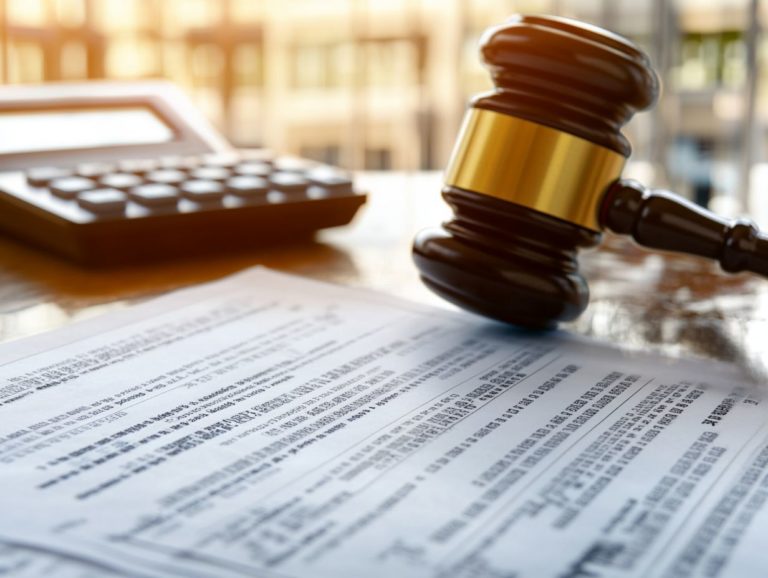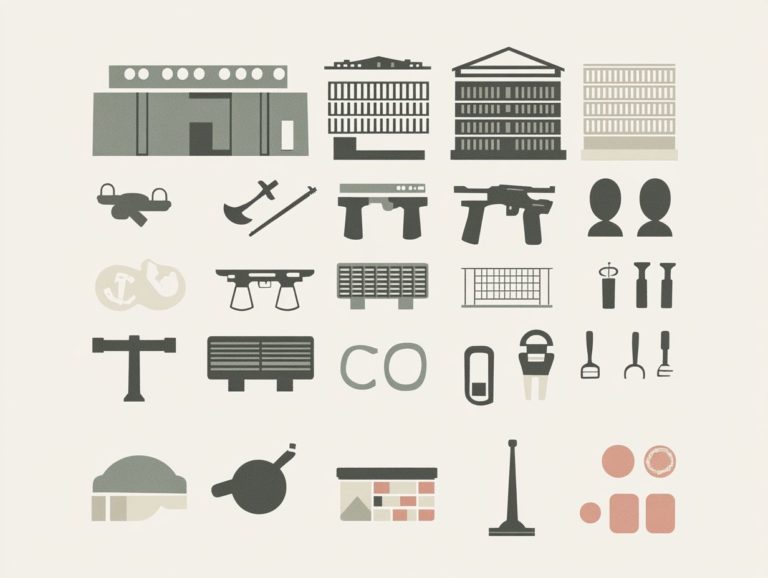How Does Bail Work in Criminal Cases?
Bail serves a pivotal function in the criminal justice system, acting as a vital bridge between arrest and trial. Grasping its definition and purpose is essential for anyone navigating this intricate landscape.
Numerous factors, including the severity of the crime and an individual’s prior criminal record, play significant roles in determining bail amounts.
This guide explains the bail process, explores the various types of bail, and highlights the serious consequences of violating bail conditions. Whether you find yourself in a legal predicament or are simply curious, it offers valuable insights into how bail operates and its far-reaching implications.
Contents
- Key Takeaways:
- Understanding Bail in Criminal Cases
- Factors Affecting Bail Amount
- Understanding the Bail Process
- Types of Bail
- Consequences of Violating Bail Conditions
- Frequently Asked Questions
- What is bail and how does it work in criminal cases?
- Who decides the amount of bail in a criminal case?
- What happens if I cannot afford to pay the bail amount set by the judge?
- Can the bail amount be changed after it has been set?
- What happens to the bail money after the case is resolved?
- Can bail be denied in a criminal case?
Key Takeaways:
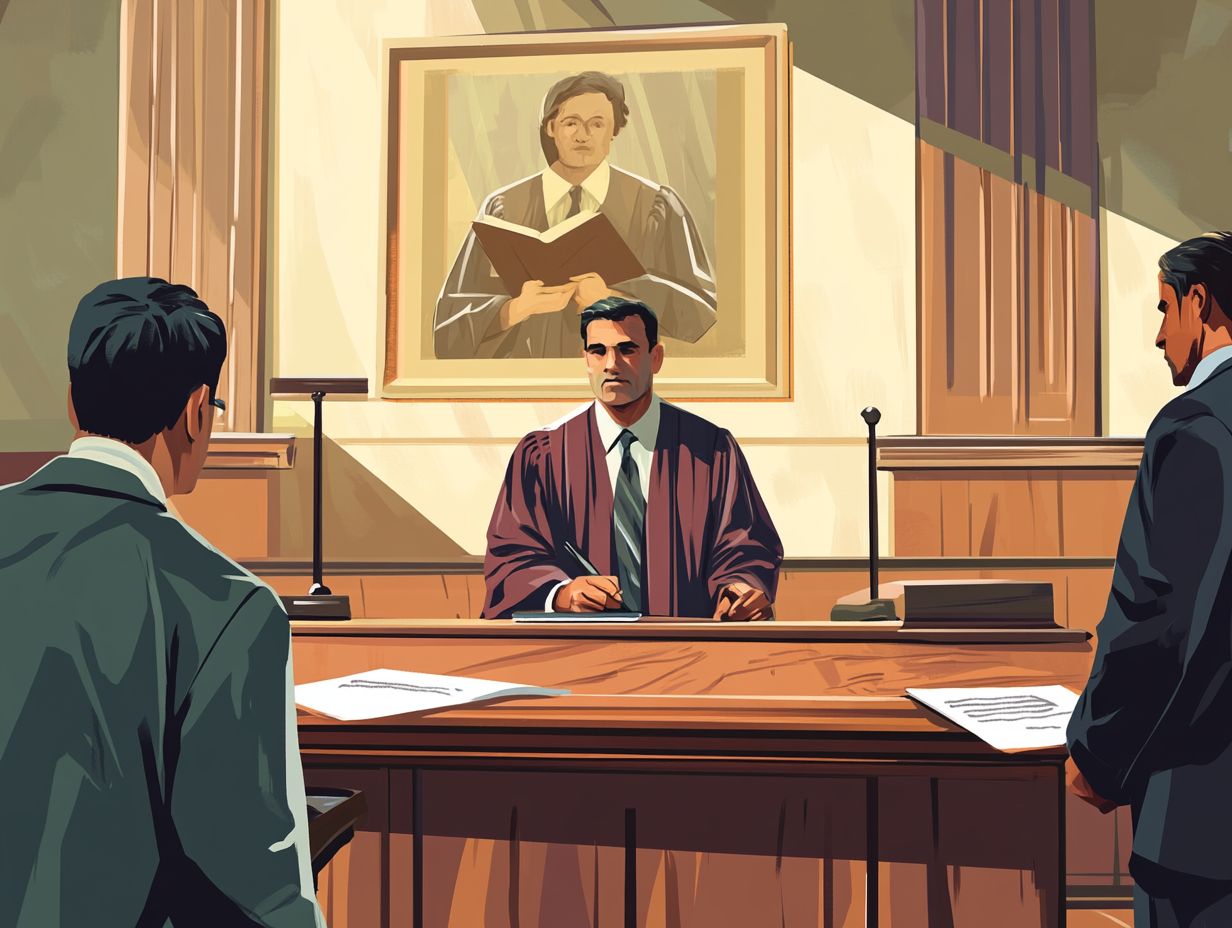
Bail is a temporary release from custody in criminal cases, granted to ensure the defendant’s appearance in court. The amount of bail is determined by various factors, including the seriousness of the crime and the defendant’s flight risk. There are different types of bail, such as cash bail, property bond, and release on recognizance, which have varying requirements and consequences.
Understanding Bail in Criminal Cases
Understanding bail is crucial for your defense! It can mean the difference between freedom and confinement. Bail allows you to secure your release from incarceration while ensuring your appearance in court for your trial.
In states like Texas, Florida, and California, the bail process may differ, but its significance remains universally acknowledged across various legal frameworks. Bail acts as a financial guarantee for compliance with court-ordered conditions. Judges meticulously consider factors such as the severity of the charges and your criminal history when determining bail.
Definition and Purpose of Bail
Bail is a financial arrangement that grants you the opportunity to be released from detention while you await your trial. It ensures you can attend court while balancing the interests of justice and public safety.
This legal mechanism is crucial, recognizing the principle of ‘innocent until proven guilty.’ It allows you to maintain your daily life, job, and family relationships instead of being confined in a jail cell before your trial.
The bail amount is typically determined by a judge and acts as a guarantee of your return. It is often accompanied by various conditions like regular check-ins or travel restrictions. Factors considered include the severity of the alleged crime, your past criminal history, and any potential flight risk. This comprehensive approach aims to protect the community while upholding your rights as the accused.
Factors Affecting Bail Amount
Several critical factors will influence the determination of your bail amount. The severity of the crime, your prior criminal record, and your likelihood of fleeing are all considered by judges.
Judges take these elements into account to protect the community and ensure that justice is upheld throughout the trial process.
Severity of the Crime
The severity of the crime plays a significant role in determining the bail amount, with more serious charges typically leading to a higher bail set by the judge. This reflects both the perceived risk to the community and the seriousness of the offense.
For example, felonies such as armed robbery or murder often result in bail amounts soaring into the tens or even hundreds of thousands of dollars. In contrast, misdemeanors, like petty theft or public intoxication, usually come with much lower bail costs, often just a few hundred or thousand dollars.
This distinction underscores the legal system’s focus on the nature of the crime and the associated risks. Higher bail amounts serve as a deterrent, helping to prevent potentially dangerous individuals from re-entering society too quickly.
If you find yourself facing bail, it is crucial to seek legal advice to navigate the complexities of your situation effectively.
Understanding the Bail Process
The bail process unfolds promptly following an arrest. It encompasses several key stages:
- Booking
- Bail hearing
- Posting of bail
This often involves a bail bond agent, who facilitates the necessary financial arrangements to secure the defendant’s release under specific conditions.
Arrest and Booking
The arrest and booking phase marks the beginning of your bail process. This is when law enforcement apprehends you based on specific charges, entering you into the legal system for processing.
During this stage, police officers follow a structured series of procedures. They will identify you, confirm your identity, and detail the specific charges leading to your arrest. Following apprehension, you ll be taken to a police station or detention center, where a meticulous booking process takes place.
This involves documenting essential information, including your personal details, the nature of the offense, and any prior criminal history. Accurate documentation is crucial; errors can complicate your bail hearings and impact your ability to secure release.
A well-documented arrest record clarifies the charges against you and influences judges’ decisions regarding bail amounts and conditions.
Bail Hearing
During a bail hearing, the court gathers to assess the specifics of your situation. This allows the judge to determine the appropriate bail conditions based on various factors, including the seriousness of the charges and the risk of flight.
The judge, the defendant, your defense attorney, and often a prosecutor representing the state will be present. This is your chance to make your case for freedom make it count!
Your defense will present arguments for your release, emphasizing community ties and a clean record. On the other hand, the prosecution will likely advocate for a higher bail or outright denial, citing potential flight risk or the severity of the crime.
The judge will weigh these arguments, balancing evidence against legal standards to arrive at a decision that considers both public safety and the presumption of innocence. This ultimately sets your bail amount and any conditions you ll need to follow.
Prior Criminal Record
A defendant’s prior criminal record plays an important role in shaping bail decisions. Judges often regard habitual offenders as higher flight risks, which can lead to increased bail amounts or more stringent release conditions.
This perception stems from the belief that individuals with previous convictions are more likely to reoffend or evade legal responsibilities. A history of repeated offenses can signify a disregard for the law, significantly influencing the court’s assessment.
The judge’s judgment during bail hearings is frequently swayed by perceived risks tied to the defendant’s past behavior. Even minor infractions can add to the overall evaluation, revealing a pattern that may lead a judge to impose stricter guarantees for release. This reflects a cautious approach aimed at safeguarding community safety.
Flight Risk
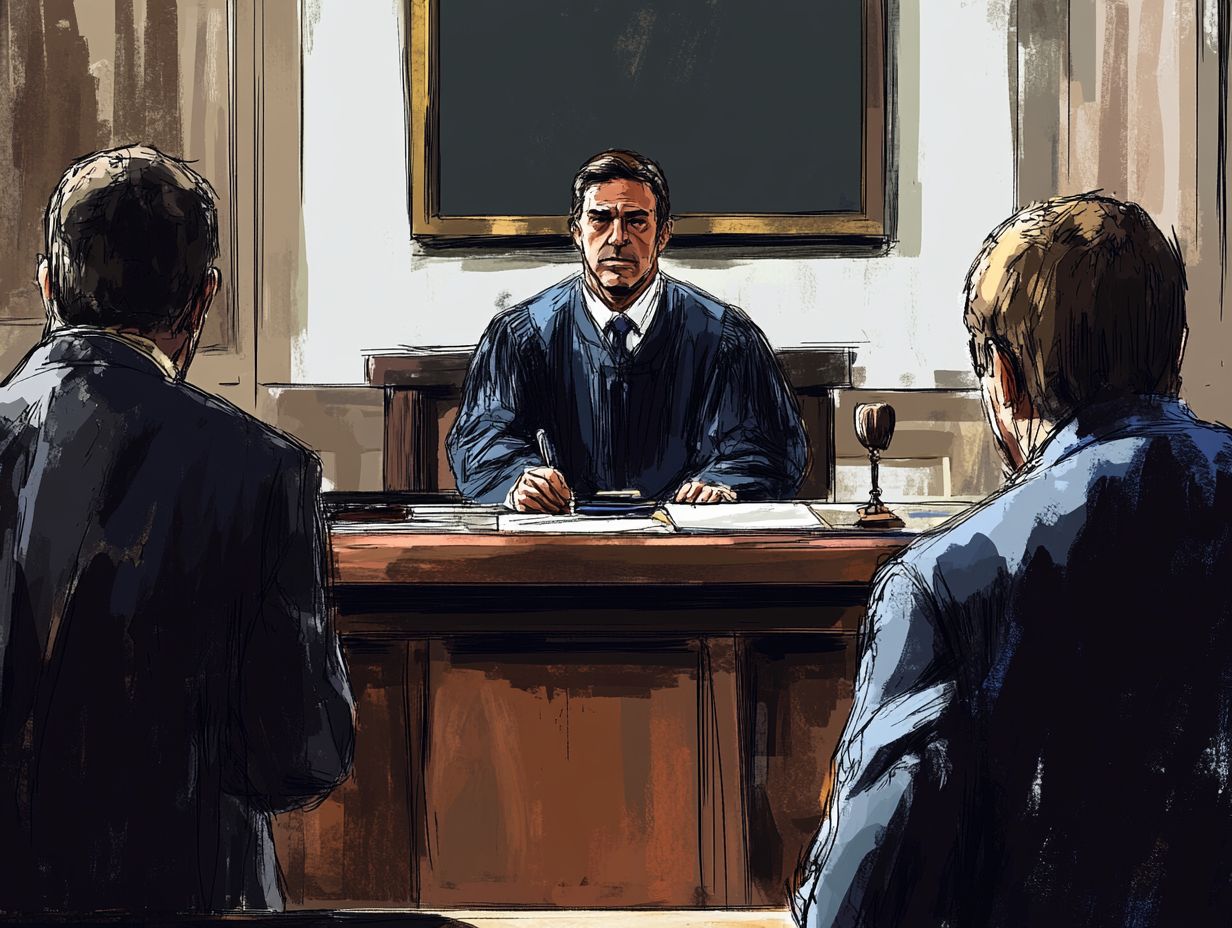
Judges evaluate the likelihood of becoming a flight risk as a crucial element in determining bail. They consider various factors, such as your background, community ties, and the nature of the charges against you.
Previous missed court dates can raise significant concerns for judges, indicating a potential inclination to evade legal responsibilities. If you lack strong community ties like stable employment, family connections, or a long-term residence judges may perceive you as more likely to skip court appearances.
As they assess these factors, the link between flight risk and bail considerations becomes clear. This highlights the necessity of a comprehensive evaluation to ensure that you are motivated to adhere to the judicial process.
If you or someone you know is facing charges, it is crucial to seek legal advice. Understanding your rights and the bail process can significantly impact the outcome of your case.
Posting Bail
Posting bail allows you to secure your release from custody. A bail bond agent can help if the amount feels steep.
This process is important. You ll need to know your payment options, which can include cash, credit card, or even property.
Here s where bail bond agents come into play; they typically charge a fee that is usually around 10% of the total bail amount and cannot be refunded. They post the bond on your behalf, ensuring the court receives the full bail amount if you miss your court appearance.
Understand the serious consequences of violating bail conditions. If you break these rules, you risk losing the bail amount and could face additional charges.
Types of Bail
Within the criminal justice system, you ll encounter various types of bail, such as cash bail, property bonds, and release on recognizance. Each of these options is designed to accommodate different circumstances.
These options enable defendants like yourself to effectively navigate legal proceedings while remaining in the community.
Cash Bail

Cash bail requires you or your family to pay the full bail amount upfront in cash. This allows for immediate release while assuring the court of your appearance at future hearings.
This system is often used in various criminal cases, especially for misdemeanors and non-violent offenses. It enables you to maintain your employment and family stability.
However, it can create a significant financial strain for those who cannot afford the required amount. This raises pressing concerns about fairness and equity.
Critics argue that cash bail disproportionately impacts low-income individuals, potentially resulting in lengthy pre-trial detentions for those unable to pay.
It s essential to understand the cash bail process, as it plays a pivotal role in discussions surrounding justice reform and access to legal resources.
Property Bond
A property bond allows you to use real property as collateral to secure bail. This enables you to leverage your assets for release while ensuring compliance with court conditions.
This arrangement offers a way to avoid the burden of paying cash bail upfront. The court will assess the property s market value to determine its suitability as collateral.
This evaluation typically involves an appraisal and thorough documentation to confirm ownership and establish a clear title.
It’s essential to understand the potential risks involved. If you fail to meet bail conditions or don t appear for your court date, this means you could lose your home.
Grasping these dynamics sheds light on the intricate relationship between property bonds and the broader bail process.
Release on Recognizance
Release on recognizance means you can go home without paying bail, based on the judge s trust in you. This is determined by assessing your reliability and the perceived low risk of flight or reoffending.
When the court is considering whether to grant this type of release, it examines several key factors, including:
- The nature of your offense
- Your criminal history
- Your connections to the community, such as your employment status and family ties
The judge scrutinizes the circumstances surrounding your case, including any previous failures to appear in court and the severity of the charges against you. This assessment seeks to ensure that your release doesn t jeopardize public safety while upholding the principle of innocence until proven guilty.
Ultimately, it aims to balance the demands of justice and the rights of the accused.
Consequences of Violating Bail Conditions
When you violate bail conditions, you risk facing serious consequences. These repercussions can include re-arrest, forfeiture of your bail amount, and even additional charges.
Judges take breaches of bail conditions very seriously. It s crucial to adhere to these conditions to avoid jeopardizing your case and your freedom.
Possible Penalties and Repercussions
Penalties for violating bail conditions can vary. They often lead to harsher outcomes you want to avoid.
This includes new charges, higher bail amounts, or even denial of bail altogether, depending on the judge.
Following all rules set by the court is critical. A single violation can bring immediate legal consequences, like fines or stricter monitoring.
Your future cases may also be affected. A history of bail violations can tarnish a judge’s view in future hearings.
You must understand these violations to navigate the legal system smoothly.
Frequently Asked Questions
What is bail and how does it work in criminal cases?
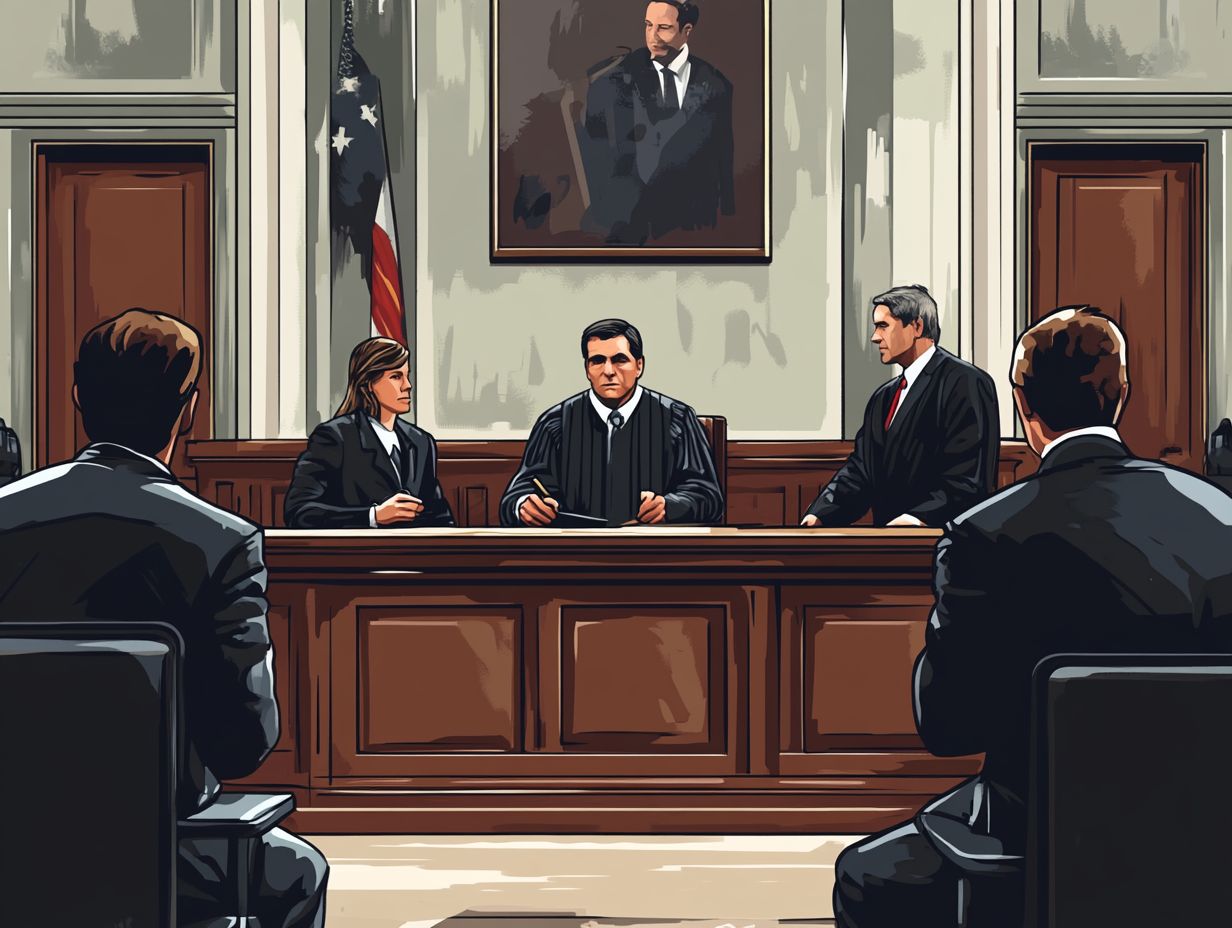
Bail is money paid to get out of jail while waiting for a trial. It acts as a guarantee that the defendant will return to court.
Who decides the amount of bail in a criminal case?
In most cases, the judge will determine the bail amount based on the crime’s severity, the defendant’s criminal history, and the likelihood of fleeing before trial.
What happens if I cannot afford to pay the bail amount set by the judge?
If you cannot afford to pay the full bail amount, you can request a bail bond from a bail bondsman. They will charge a non-refundable fee, usually around 10% of the total bail amount, and post the full bail on your behalf.
Can the bail amount be changed after it has been set?
Yes, the judge may reconsider the bail amount if new information arises. This could lead to an increase, decrease, or even elimination of bail.
What happens to the bail money after the case is resolved?
If the defendant complies with all court appearances and the case is resolved, the bail money will be returned to the person who paid it. If the defendant fails to appear, the bail money will be forfeited.
Can bail be denied in a criminal case?
Yes, bail can be denied for more serious crimes or if the defendant is considered a flight risk. The denial is at the judge’s discretion and is not common.

